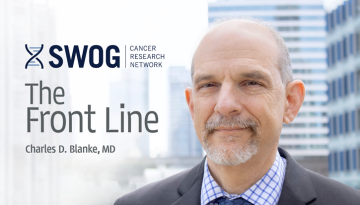Meet The Advocate: Barbara Segarra-Vazquez
Barbara Segarra-Vazquez is our patient advocate for the cancer care delivery committee. She has a singular goal for her work with SWOG – to increase diversity in every facet of our group. This means recruiting more racial and ethnic minorities (and more LGBTQ+ and bilingual and rural folks, more young people, more immigrants, and more women) as SWOG members, leaders, and participants in our trials.
What makes Barbara such a valuable advocate for diversity, equity, and inclusion is her unique perspective. She’s as interested in who does the research as who joins the research. If you get more people of color conducting clinical trials, Barbara believes, you’ll get more people of color joining clinical trials!
“If we want to increase diversity and reduce disparities, we have to look at the whole cycle of cancer research – including the people who do the work,” she says. “If someone is part of a community, they’re more aware of the issues facing that community and will design studies that reflect that particular reality. And they often go back to their communities to conduct their research, which can increase access.”
Barbara definitely knows what she is talking about. She serves as dean of the School of Health Professions at the University of Puerto Rico in San Juan, overseeing academic programs that educate and train physical and occupational therapists, speech pathologists, clinical laboratory workers, and more. She also runs a program that graduates Hispanic clinical researchers. In 2003, she started working as the academic coordinator of a new program that offers master’s degrees in clinical research to Hispanic candidates, thanks to funding from at the National Institute on Minority Health and Health Disparities. In 2017, she became the co-principal investigator for that project, known as the Hispanic Clinical and Translational Research Education and Career Development (HCTRECD) program. They’ve graduated 87 scholars with post-doctoral masters’ degrees in clinical and translational research, who now conduct clinical studies in cancer, HIV/AIDS, diabetes, maternal health, mental health, and more.
“Who designs and conducts clinical studies matters,” she says. “These studies will be culturally appropriate right from the start, and when these researchers are working with peers, they’ll be at the table to influence their work as well. It helps to have diversity built right into a team.”
Barbara started her research advocacy journey as so many of our patient advocates do – as a patient with cancer. In 2003, when her two sons were still in elementary and middle school, Barbara was diagnosed with breast cancer. She had surgery, six months of chemotherapy, and 34 rounds of radiation. In 2017, her cancer returned. She had a mastectomy, and feels stronger than ever.
Between these cancer experiences, she became a research advocate – a clear path for someone already passionate about science. A few years after her first diagnosis, she began volunteering for Susan G. Komen in Puerto Rico. Then she attended AACR’s Scientist-Survivor program, then went to her first San Antonio Breast Cancer Symposium, and the rest is history. Today, Barbarais a co-founder of Hispanics Increasing Diversity to Enhance Advocacy in Science (HIDEAS) , a training program for Puerto Rican breast cancer survivors who want to be research advocates. She also is active in FORCE, which helps families dealing with hereditary cancers, and with Advocates for Collaborative Education, a cross-cancer group of research advocates that formed last year. She serves as vice chair of the steering committee of Komen Advocates in Science, and presented last year at the first-ever Advancing the Science of Cancer in Latinos conference in San Antonio.
Within SWOG, Barbara also serves as the advocate representative to our Post-COVID Innovation Task Force. I appreciate Barbara’s deep expertise and boundless energy. Her enthusiasm for cancer trials is contagious.
“I say ‘yes’ to everything,” she says. “That way, I learn so much. And I don’t consider what I do for SWOG as work. I consider it my passion.”
Other Recent Stories



